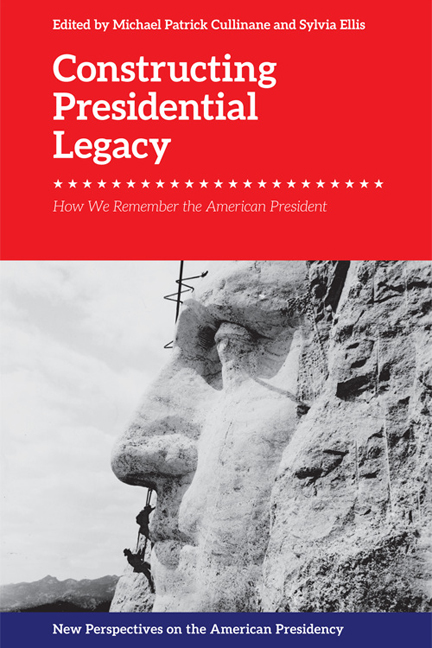Book contents
- Frontmatter
- Contents
- Acknowledgments
- Notes on Contributors
- An introduction to Presidential Legacy
- 1 Presidential Temples: America’s Presidential Libraries and Centers from the 1930s to Today
- 2 Presidential Legacy: A Literary Problem
- 3 Pennsylvania Avenue meets Madison Avenue: The White House and Commercial Advertising
- 4 Eisenhower’s Farewell Address in History and Memory
- 5 Pageantry, Performance, and Statecraft: Diplomacy and the Presidential Image
- 6 “You’ve got to decide how you want history to remember you”: The legacy of Lyndon B. Johnson in film and Television
- 7 The Farewell Tour: Presidential Travel and Legacy Building
- 8 Reflecting or Reshaping?: Landmark Anniversaries and Presidential Legacy
- 9 From a “New Paradigm” to “Memorial Sprawl”: The Dwight D. Eisenhower Presidential Memorial
- 10 Top Trumps: Presidential Legacies, New Technologies, and a New Generation
- Epilogue: Confessions of a Presidential Biographer
- Index
2 - Presidential Legacy: A Literary Problem
Published online by Cambridge University Press: 01 May 2021
- Frontmatter
- Contents
- Acknowledgments
- Notes on Contributors
- An introduction to Presidential Legacy
- 1 Presidential Temples: America’s Presidential Libraries and Centers from the 1930s to Today
- 2 Presidential Legacy: A Literary Problem
- 3 Pennsylvania Avenue meets Madison Avenue: The White House and Commercial Advertising
- 4 Eisenhower’s Farewell Address in History and Memory
- 5 Pageantry, Performance, and Statecraft: Diplomacy and the Presidential Image
- 6 “You’ve got to decide how you want history to remember you”: The legacy of Lyndon B. Johnson in film and Television
- 7 The Farewell Tour: Presidential Travel and Legacy Building
- 8 Reflecting or Reshaping?: Landmark Anniversaries and Presidential Legacy
- 9 From a “New Paradigm” to “Memorial Sprawl”: The Dwight D. Eisenhower Presidential Memorial
- 10 Top Trumps: Presidential Legacies, New Technologies, and a New Generation
- Epilogue: Confessions of a Presidential Biographer
- Index
Summary
What is presidential literary legacy? What does it mean to “read” the life of Washington as Royall Tyler suggests, to interpret a literary sketch authored by Theodore Roosevelt or to discern New Deal realpolitik in the private writings of a Matanuska Valley colonist? What do we discover of presidential legacy in Jefferson's nod to Shakespeare, or Pound's nod to Jefferson? In Reagan's American Life, or Carter's Keeping Faith? What does it entail, beyond politics of race or reason, for President Barack Obama to invoke Atticus Finch (“a great character in American fiction”) in his 2017 Farewell Address: “You never really understand a person until you consider things from his point of view, until you climb into his skin and walk around in it?” And what does it signify that “his” presides as a modifier to the legacy of life in office? These are the concerns of this chapter.
The examination begins with a simple assertion that the broadly political phenomenon of presidential legacy is an inheritance of public memory, and in order to engage it rightly, I suggest, we must admit that memory is a great multiplicity of fictions, as well as a robust cultural voice of heritage. Interpretations of presidential leadership certainly appear in enough texts, either through presidential characters or metaphors for the executive office. One can think of William Wells Brown's entropic novel Clotel; or The President's Daughter (1853); L. Frank Baum's The Wonderful Wizard of Oz (1900), which recalls the election of 1896; likewise Harper Lee's admonition against “fear itself” in To Kill a Mockingbird (1960) repeats FDR's famous adage; Gore Vidal's critical history in An Evening with Richard Nixon (1972); Philip Roth's provocative counter-imaging in The Plot Against America (2004); even Hamilton's enrapt cast on presidential election and administration; or twenty-first-century Mexican American verse, casting slam rhyme to the border. Presidential legacy in statecraft, art, and memorial is, after all, the Technicolor at-home production of a wider transnational story, pictured in its character and office via cross-woven histories, narrative omissions, prevailing scripts, and constituent views of a watching and reading world.
- Type
- Chapter
- Information
- Constructing Presidential LegacyHow we Remember the American President, pp. 26 - 54Publisher: Edinburgh University PressPrint publication year: 2018



